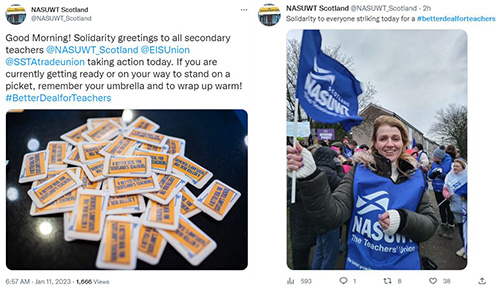Exams rescheduled as Scottish teachers strike for a second day
Almost all of Scotland’s secondary schools are closed today (Wednesday 11 January) as teachers continue industrial strike action in a dispute over pay.
It is the second day of strikes after most Scottish primary schools were closed yesterday (Tuesday 10 January).
They join ambulance staff belonging to GMB and Unison, the two largest ambulance unions who are also back on the picket lines for the second time this winter. This time call handlers, emergency care assistants and ambulance dispatchers are also walking out.
Today’s walk out has affected preliminary exams in some Scottish secondary schools which have had to be rescheduled, and revision schedules disrupted.
The strikes involve members of the EIS, NASUWT, SSTA and the AHDS unions.
They have rejected a 5% pay increase, arguing for 10%. The latest offer includes rises of up to 6.85% for the lowest-paid staff.
If no agreement is reached, teachers in Scotland plan to strike on a further 16 days, beginning next week.
The days of action - split across every council in Scotland - will take place throughout January and into February with teachers in two local authorities striking on each of the 16 days.
Education Secretary Shirley-Anne Somerville told MSPs on Tuesday that she would leave "no stone unturned" to bring about a quick resolution to the strikes.
She previously told BBC Scotland the union pay demands were "simply unaffordable".
Mike Corbett, NASUWT Scotland national official, said the action on Wednesday will have had an impact on the exam diet for some schools.
He told the PA news agency: “It will depend on individual schools. A lot of schools have their prelims in January and there’s no doubt that there will be some schools around who will have had some preliminary exams scheduled for today, that they have had to shift.”
“We’ve not heard of that posing any particular problems for these schools, they will presumably have just shifted them to a bit later on. We will be talking about small numbers of individual schools and pupils that that will affect.
“As we’ve said all along, I don’t think any of our members want to be out on strike today but despite some talks and pay negotiations there’s still no revised pay offer on the table, it’s the same offer as in November and they feel pushed into a corner.”
Mr Corbett said: “We noted the Cabinet Secretary’s statement to the Scottish Parliament about leaving no stone unturned in seeking a resolution.
“We will take her at her word and hope to see a revised offer and hope to see a resolution of the dispute.”
Last-ditch talks between unions and Scottish government officials held on Monday failed to prevent the strike action.
Conservative MSP Stephen Kerr said teachers were on strike for the first time in 40 years, because the SNP government had "repeatedly let them down".
The Lib Dems' Willie Rennie asked if there would be a new offer for teachers, saying: "The education secretary does seem to be very chilled out and relaxed."
'Slight progress'
General Secretary of the EIS, Andrea Bradley said primary school teachers on the picket lines had received "strong support" parents on Tuesday.
She said there had been "slight progress" in discussions over the past week but the unions were still waiting for an improved pay offer from the Scottish government and local government body Cosla.
"The reality is that only a substantially improved offer can end this dispute - and it is down to the Scottish government and Cosla to deliver that improved pay offer to teachers," she added.
Most state-school teachers in England and Wales were given a 5% pay rise in 2022. In Northern Ireland many teachers have been offered 3.2% for 2021/22 and 2022/23.
But unions argue that inflation above 10% means these increases amount to pay cuts.
Currently, teaching unions in England and Wales are balloting members over pay.
Mr Corbett concluded "The fact we are talking is progress itself, but I have to say there is still quite a distance between what is on the table and what teachers are looking for.”
"The last offer was dressed up as an improved offer but it remained, for the vast majority of teachers, the 5% offer that had been around for months."
He went on to say that historically teacher pay had been getting "worse and worse" since 2010 and that was reflected in the recruitment and retention figures.
First Minister Nicola Sturgeon spoke to journalists about the strike on Tuesday. She said: “I deeply regret that we have industrial action in our schools. I don’t think that’s in the interest of young people at all.
“That said, I understand the strength of feeling of teachers and we highly value the teaching profession.”
“I can’t create additional funding that we don’t have and I’ve tried to be really honest with unions across the public sector. We’re trying to be as fair as possible while maximising pay increases.”







